If you experience uncomfortable dry eyes in winter, you’re not the only one. Winter can be the worst time of year for dry eye sufferers.1
The cold, windy months of winter can cause and exacerbate dry eye symptoms, both indoors and out. The air outside gets drier as temperatures drop, causing loss of moisture in your eyes due to evaporation. While indoors, the dry air from heaters can lead to dry eyes inside.1
In many cases, symptoms of dry eye disease are worse in winter. This article will explore the many reasons dry eyes are worse in winter, and steps you can take to prevent and treat the symptoms.
What Causes Dry Eyes in Winter
Dry eye is a very common eye health condition, affecting millions of adults. Dry eye disease has a variety of causes and tends to be prevalent during the cold winter months because of the low humidity causing drier air around you.1
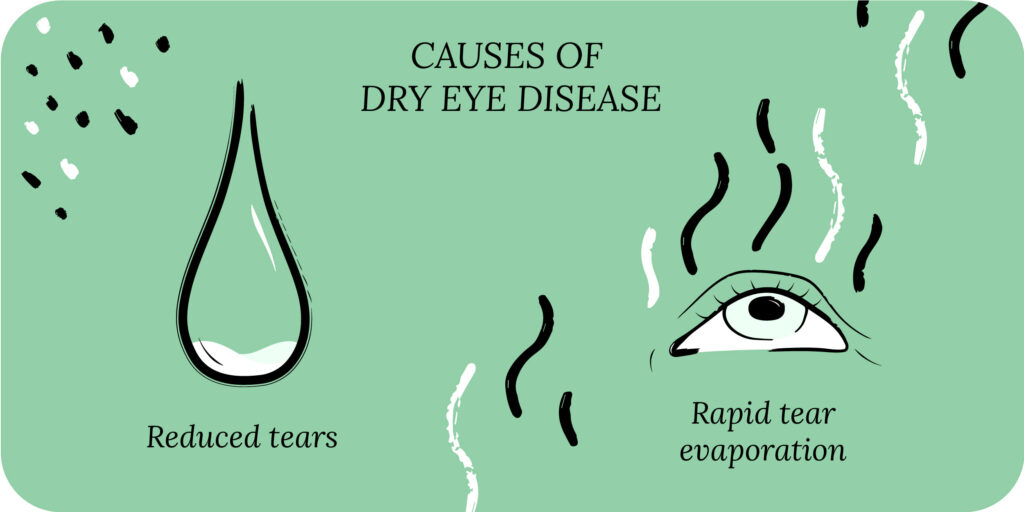
Dry eyes in winter are caused by conditions that impact your eye health whether you are outside in the cold or exposed to indoor heating.
Outdoors, exposure to cold temperatures and wind impact your eye health during the winter. When you head indoors to get out of the cold, your eyes are met with heated, dry air thanks to the use of heaters.
Moisture on the surface of your eyes is vital to your eye health. Dry eyes are caused by tear film instability, which results in surface moisture and lubrication evaporation. In dry climates and during winter months, there is an increased risk for dry eye syndrome because the tear film becomes unstable and less effective in protecting the cornea.2
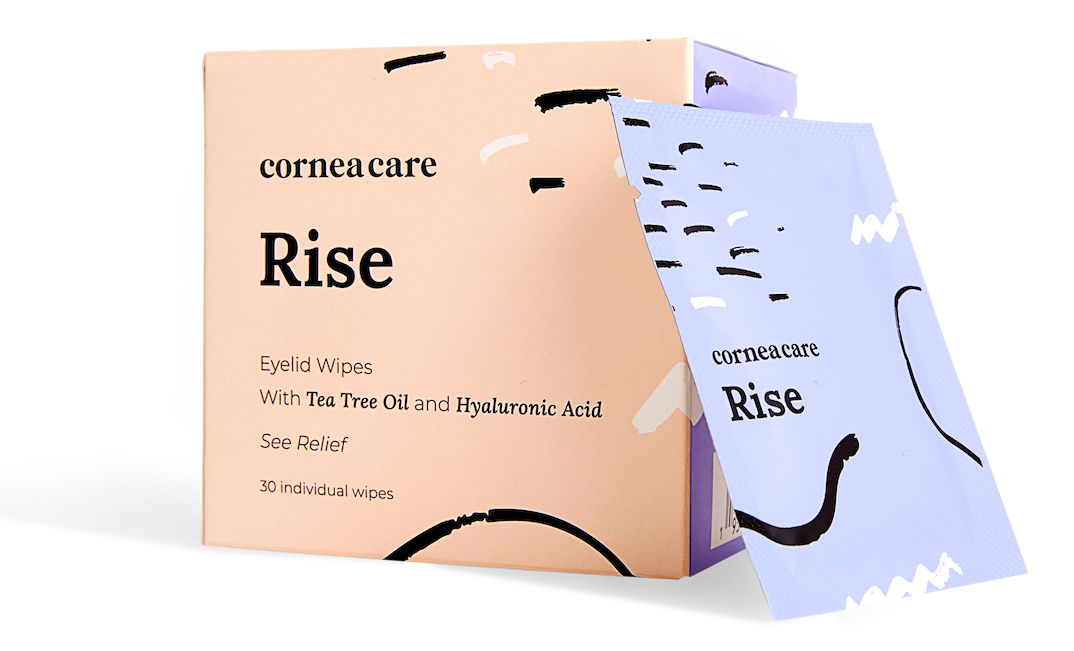
Rise
Eyelid Wipes
Perfect for eye dryness, itching, burning, and crusting/flaking of eyelashes. Free shipping 📦
Try today - $25
During the winter months, or in dry climates year-round, the risk of dry eye disease increases. Studies show that weather has a major impact on dry eye symptoms, with winter and spring being the hardest months for dry eye sufferers.3,4
A lack of tear production can also lead to dry eyes if there are not enough tears to keep the eye moist. This is also related to dry conditions and dehydration.
Other causes of dry eye disease include aging, genetics, smoking, LASIK surgery, and the use of contact lenses.2
Symptoms of Dry Eyes in Winter include:
- Dryness2
- Blurred vision
- Burning or itchy eyes
- Light sensitivity
- Eye fatigue
- Contact lens discomfort
- Red eyes
- Watery eyes
- Gritty feeling
- Foreign object sensation
- Difficulty blinking
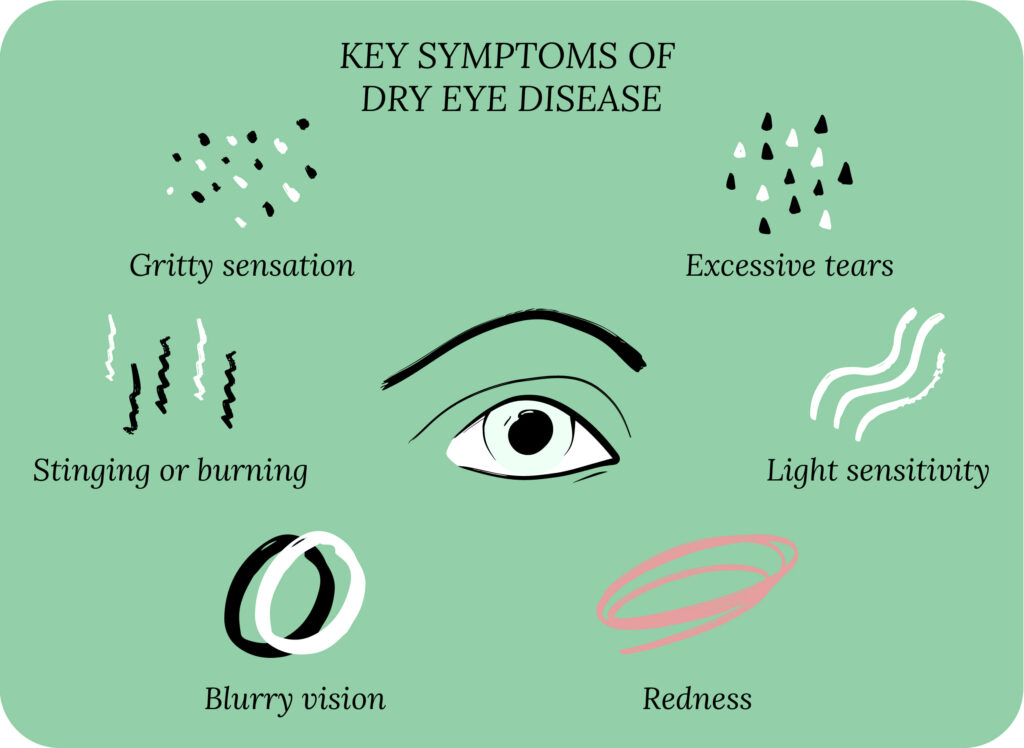
Caring for Dry Eyes In Winter
Dry eyes are a common occurrence in colder, winter months because of the dry climate and low humidity.5
Preventing Dry Eyes in Winter at Home and Work
A few changes to your indoor heating choices can help ease or prevent dry eyes in winter.
- Avoid excess heat. It’s understandable that you’ll put the heat up as the days and nights grow cold, but try not to overdo it. Keep your home a little cooler and wear a sweater during the day, and an extra blanket at night.
- Don’t sit or sleep close to heating air vents or fans, as the forced indoor air will dry and irritate your eyes. Don’t use a hairdryer for long periods, and never point it directly at the eyes.
- Use a humidifier at home and work. Both warm and cool mist humidifiers add moisture to the air, easing symptoms of dry eyes as well as other common winter ailments such as nasal congestion, allowing you to sleep better at night. Good rest is important for your eyes too!
- Avoid smoke as much as possible, including secondhand cigarette smoke and wood stoves.
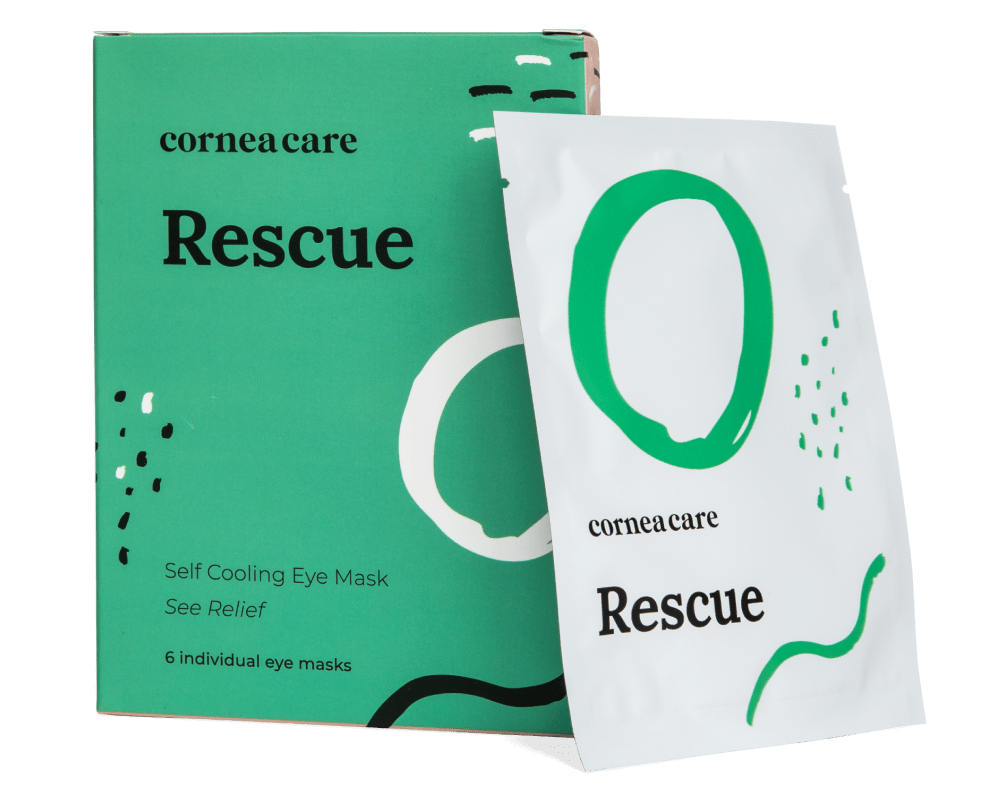
Rescue
Cold Compresses
Perfect for sudden flare-ups of eye dryness, pain, burning, and swollen/inflamed eyelids. Free shipping 📦.
Try today - $12
Preventing Dry Eyes in Winter Outdoors and While Driving
There are a number of ways to protect your eyes outdoors and while driving.
- Remember to wear sunglasses outside and while driving. The sun reflecting off snow can be blinding, and the UV rays can damage the cornea, and lead to dry eye disease.6
- In the car, keep the heat to a minimum and direct the air vents away from your face to avoid forced air blowing at your eyes.
- Protect your eyes from wind and blowing snow. Wear eye protection such as goggles or sunglasses while shoveling snow or using snow blowers.
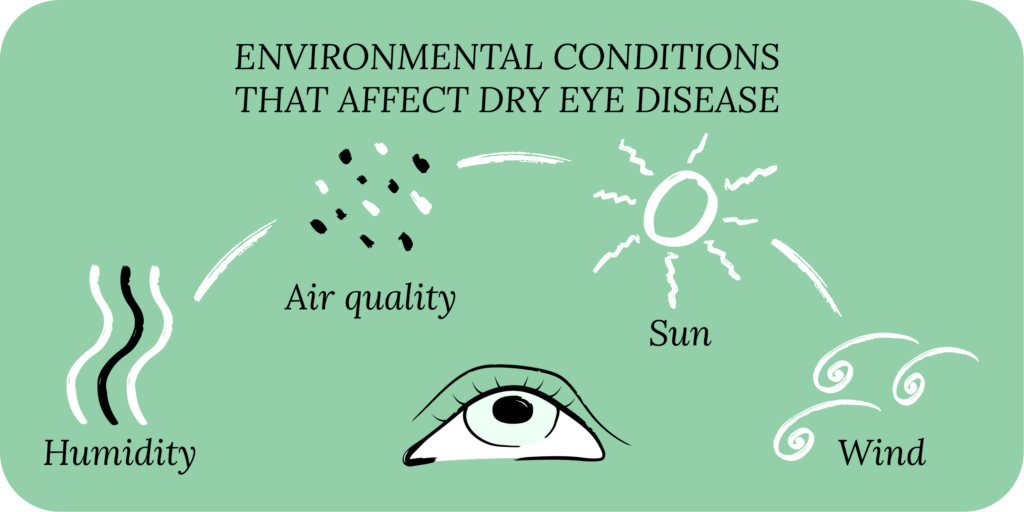
Lifestyle Changes to Prevent Dry Eyes in Winter and Year-round
As the temperatures drop, take steps to prevent dry eyes in winter. With a few simple lifestyle changes, you can keep your eyes healthy and comfortable through the cold weather of the winter months.
- Make the change to a whole food healthy diet rich in vitamins, minerals, and antioxidants. To fill in the gaps in your diet, include a supplement such as CorneaCare Eye Vitamins & Minerals, a daily multivitamin for eyes, mind and body.
- Eat foods that contain omega-3 fatty acids such as salmon, cod, walnuts, and flaxseed oil7, and add CorneaCare Triple Strength Omega-3 supplements.
- Stay hydrated. It’s easy to forget to drink water, but this will irritate dry eyes, and may cause dry itchy skin and other symptoms of dehydration.
- Remember to take regular screen breaks, and use the 20-20-20 rule. According to the American Optometric Association recommendation: “every 20 minutes, shift your eyes to look at an object at least 20 feet away, for at least 20 seconds.”8
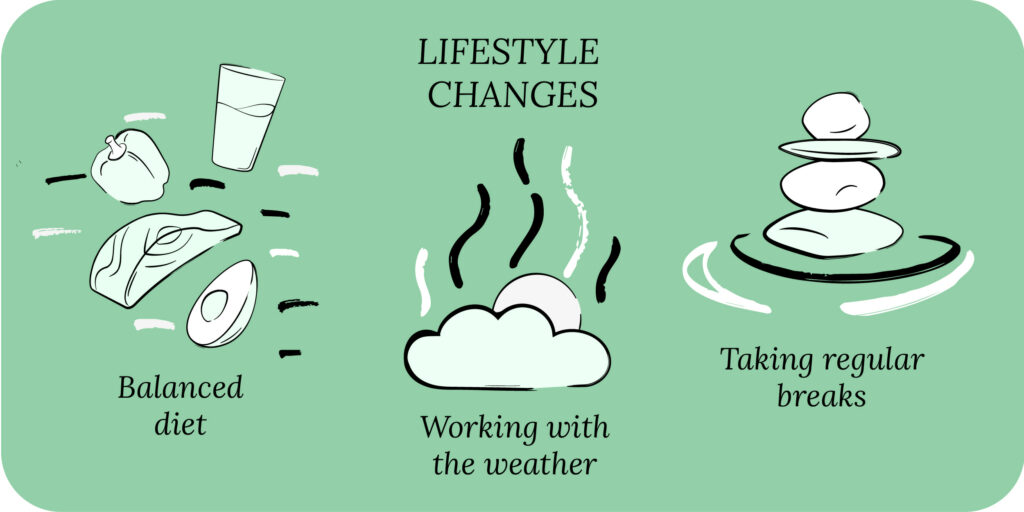
Best CorneaCare Products to Ease Your Dry Eyes in Winter
- Eyelid Hygiene is the foundation of eye health & wellness. CorneaCare Eyelid Hygiene products help you prioritize your eyecare. Our eyelid Wipes contain hyaluronic acid and tea tree oil, perfect for eye dryness, itching, burning and crusting/flaking of eyelashes.
- You can try a warm washcloth over your eyes several times a day. Alternatively, CorneaCare Self-Heating Warm Compresses provide instant warmth plus hydrated minerals perfect for eye dryness, fatigue, tearing, puffiness of the eyelids and styes. No washcloth or microwave required!
- Over-the-counter artificial tears may provide temporary relief, however they may contain preservatives that irritate the eyes. CorneaCare Preservative-free Artificial Tears lubricate and nourish your eyes to fend off inflammation, promote anti-oxidation and enhance hydration to optimize your visual comfort.
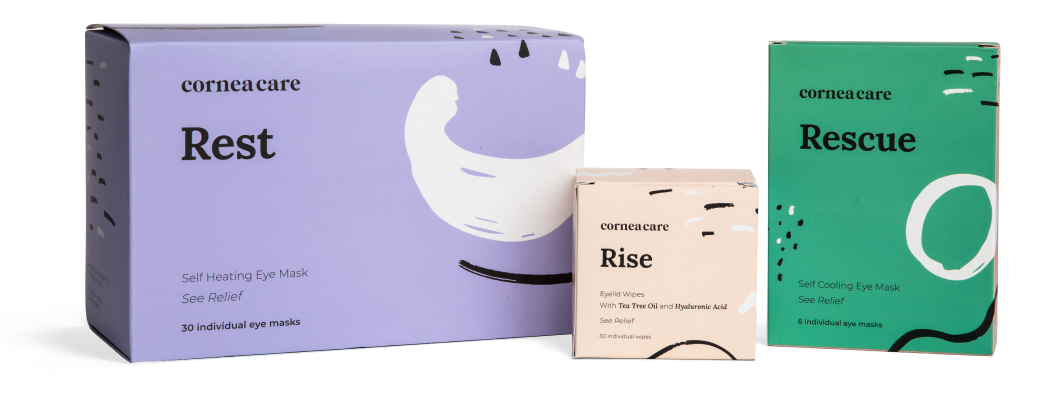
All Rounder
Eyelid Hygiene Plan 3
Perfect for eye dryness, burning, itching, grittiness, crusting/flaking of eyelashes and inflamed/swollen eyelids. Free shipping 📦.
Try today - $60
When to See Your Eye Doctor
If you experience frequent dry eye symptoms, make an appointment to see an eye doctor (optometrist or ophthalmologist) for an eye exam. An eye doctor can diagnose the cause of your pain and discomfort and recommend treatment, such as prescription eye drops or punctal plugs, which preserve your natural tears.
Your eye doctor can properly determine whether you are suffering with dry eye disease, and the type, or if your dry eyes are caused by an underlying medical condition.
Putting it All Together
Dry eyes in winter are very common thanks to dry, cold and windy weather, and dry heat indoors. Take steps to avoid excess heat and blowing air, add moisture with a humidifier at home, and implement simple lifestyle changes.
Practice good Eyelid Hygiene and try adding preservative-free artificial tears to soothe and lubricate your eyes as needed.
If these changes don’t improve your symptoms, see your eye doctor.
What’s Next
Learn to love your eyes! Read more eye health and wellness tips on our blog.



